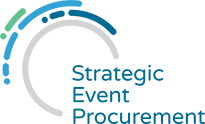Improve Your RFP Responses for Events

You’ve worked hard to build a relationship with one of your key clients, and now you’ve been invited to respond to an RFP for a new project. This is a great opportunity to grow your book of business! How can you put your best foot forward and win the business?
Over my career, I’ve reviewed literally hundreds of RFP responses. I found Three Deadly Mistakes that separated the successful bids from the ones who didn’t get the business. Making even one of these mistakes lets your competitor in the door and can put you on the slippery slope of losing thousands of dollars, or even the entire account. Don’t let this happen to you!
Deadly Mistake #1 –
You didn’t answer the question where it is being asked.
This is my biggest pet-peeve! Answer each question in the space allowed for it. Do this even if you’ve already provided similar information elsewhere in your response. When a supplier says “see above” or “refer to appendix A” instead of answering the question, it requires your client to do your job. In the time it takes your client to look for the answer, interest is lost and the opportunity to impress with your answer is replaced with frustration. Remember, the person reviewing your response is comparing your answer to your competitors, often side by side on a computer screen. Don’t lose your opportunity to impress your client. Make it easy for them to see how you are the better choice!
Deadly Mistake #2 –
You used your marketing “boiler-plate” content instead of tailoring the answer to the client’s unique needs.
The worst example of this I’ve seen is where the supplier forgot to take out [insert client name] in one of the paragraphs. No, I’m not making this up. Even if you don’t make that egregious mistake, it’s pretty easy to spot boilerplate answers, because they don’t specifically address the client’s unique needs. Instead of summarizing how your company approaches projects, make your answer stand out by telling your client exactly how you will manage their specific project, or solve their unique problem. If possible, include team bios in an appendix so they can see you’ve put thought into solving their problem. In this case, it’s OK to refer the reader to an appendix to supplement your answer.
Deadly Mistake #3 –
You did not quantify your answer with clear examples of your experience and previous successes.
This one can be tricky. Maybe the question is something like “Give an example where you’ve done this type of work before.” Guard against answers like “At Our Company, we handle projects like this all the time. Our staff has an average tenure of 10 years at Our Company, and collectively, we have over 250 years in industry experience. Using our seven-step project management methodology, we create custom plans for our clients to ensure success.” Not only is this a boiler-plate response, but it also doesn’t answer the question.
Instead, provide a case study that shows a comparable project, with as many specifics as you can provide without disclosing confidential information from your other client. Even better if you can get permission to use their name!
If you haven’t done the specific type of work before, don’t worry! You’ve been invited to the RFP because your client wants to see what you can offer. Offer a case study where your team served another client with different, but unique needs. Be specific about how you would use what you learned to make this client’s project a huge success.
Now that you know the Three Deadly Mistakes, how will you avoid making them? Would you like to have a procurement expert review your next RFP response before you submit to your client? Let me help your company navigate Procurement without pain and win more business. Contact us to schedule a free, initial 30-minute consultation.
READY TO LEARN MORE?
Take advantage of a free 30-minute consultation to get to know each other.
